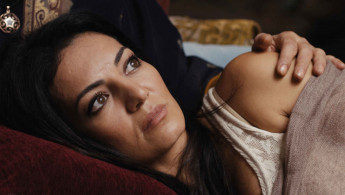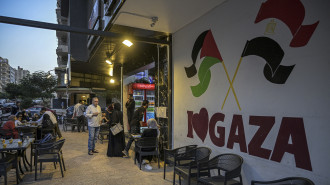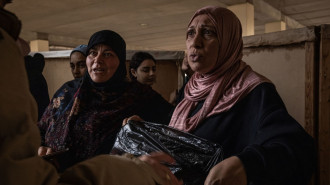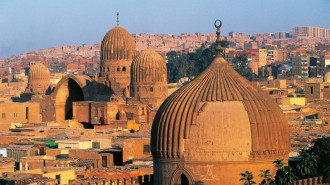Razzia: Nabil Ayouch's critical multi-threaded homage to Morocco's cultural tapestry
When it comes to making movies about Morocco, tough love is the only way director Nabil Ayouch can fully express himself.
Like novelist Tahar Ben Jelloun and artist Mounir Fatmi, who also divide their time between Paris and Morocco, Ayouch is among a small elite that gets away with criticising his country.
"I just forbid myself from considering anything off limits," he said in an interview with The New Arab at the 39th annual CINEMED festival in Montpellier, where Ayouch's ninth film, Razzia, was the opening night selection among the festival's 100 films from countries around the Mediterranean.
Razzia opens in Morocco on 21 February, 14 March in France, and 25 April in Belgium, while Amazon has purchased the rights to distribute the film in the US, Canada, the UK, India and Australia.
Despite the fact that Razzia shows fiercely independent women in contrast with government officials who are zealots for a more conservative society, Morocco has submitted the film to Los Angeles as its official selection for both the Oscars and the Golden Globes.
And this is not the first time Nabil Ayouch's work has represented Morocco. His debut feature, Mektub, was submitted to the Academy for Oscar consideration in 1997, as was his 2012 movie, Horses of God.
|
Since the reign of King Mohammed VI began in 1999, Morocco has proven itself among the most stable and forward-moving countries of North Africa, and yet press freedoms remain restricted, the economy has failed to integrate thousands of young college graduates, and unrest roils in both the south and the north. In the Western Sahara, once under Spanish rule, Sahrawis continue to fight for independence from Morocco, represented by the militant Polisario Front. In the north, meanwhile, in the Rif, a traditionally Amazigh region, frequent protests have been ongoing since October 2016, when police ordered a garbage truck driver to punish Mouhcine Fikri, a 31-year-old fishmonger who jumped into the truck after police tossed his goods, and was crushed to death. Thousands of protesters have demonstrated in Rabat, Casablanca and beyond. Razzia’s poetic yet harsh look at life in Morocco notwithstanding, the landscape continues to evolve. In 2011, the Moroccan constitution was amended to lend more support to the Amazigh and Jewish populations. In Essaouira and Fez, historic Jewish medinas are being revived, and synagogues are being refurbished. It's become commonplace now to find street signs in Arabic, Amazigh and French. Last year, the Arabisation education laws were changed when French was reinstated as the main language of instruction in primary education, re-opening Morocco further to the world. And the 2016 Marrakesh Declaration reaffirmed the rights of Morocco’s religious minorities. And yet, many younger Moroccans dream of leaving the land they both love and hate. Their hogra, or feeling of being crushed by the system, remains palpable. One PhD student in his late 20s, Habib D, explained: "All the Moroccan youth feel in one way or another oppressed. They’re waiting for the right moment to act. Lots of young people are unemployed and poverty is only quickly escalating. Functionaries complain all the time and they can't go on strike anymore. For foreigners things look normal. Many people have been arrested in relation to the protests in the Rif… I spent two days in a police station last July on the way to the United States. The police arrested me and handcuffed me at the airport. They said I was trying to take people to the States as illegal immigrants. The conditions in the cell in the police station were inconceivably inhuman. I was so scared, and I am in fact traumatised. Only my closest friends know." Habib will soon complete his PhD. and he hopes to find a way to move abroad. "I don't think I’ll stay here," he said. "I just can’t change things because of the deeply rooted corruption. I feel I need to find a way out and settle somewhere." |
For 20 years, the government of Morocco has continued to bet on the talent of Nabil Ayouch, despite the fact that they may disagree with his methods.
"I make films with total sincerity, I say what I think, I don't pull my punches. Either you accept what I have to say or you don't," Ayouch avows.
Co-written with star Maryam Touzani, Razzia is an ensemble narrative, not unlike Paul Haggis' Crash (2004), set in Morocco in the early 1980s and in 2015.
At the outset, Abdallah, an idealistic young educator, travels by bus along a dusty road to a remote, predominantly Amazigh (Berber) village in the Atlas mountains, where he begins teaching children about the outside world in their own language.
Meanwhile, in present-day Casablanca, Salima (Touzani), a young woman looking for her future, negotiates her place with her partner, ostensibly opting for an abortion when the relationship feels lopsided in the man's favour.
There is also Hakim who, though he has a college education, wants nothing more than to be a pop singer. His idol is the late Freddie Mercury of Queen, and his anthem is "We Are the Champions".
And then there's Joe, a Moroccan Jewish restaurant owner in Casablanca, who, 20 years later in the story, employs Ilyas, one of the Muslim-Berber boys from the early 1980s who had been taught by Abdallah.
With its interwoven narrative, constructed around the overwhelming desire for freedom, Razzia features multiple sets of characters who question everything, including and especially a patriarchal Moroccan society where corruption and lack of opportunity remain endemic.
The film casts a critical eye at the foreign-raised Arabic teachers sent to Morocco in the early 1980s, from Syria, Egypt and Saudi Arabia, who embodied a more obscurantist, less tolerant practice of Islam, and who brought a stultifying educational style into the schools, at a time when Morocco was struggling to modernise its society, and increase international tourism.
Razzia also pays homage to Morocco's organic diversity, portraying memorable characters who are Amazigh or Jewish - two communities indigenous to Morocco which pre-date Islam.
 |
Women in Algeria, Tunisia and Morocco are resisting and struggling everyday for their rights |  |
Strong women
During the interview in Montpellier, Ayouch ventured that Razzia was the direct descendant of his last feature, Much Loved (2015), a story about four rebellious prostitutes in Marrakech. The film is still banned in Morocco and brought him death threats after it was screened at Cannes.
 |
|
| Husband-and wife-team Ayouch and Touzani [Eric Catarina] |
Touzani, meanwhile, declares that she is much like her character, Salima. "I have the same fears, and the same desire to be free," she says.
A native of Tangier and a London-trained journalist who began making short films in Morocco in 2011, before completing Razzia’s screenplay with Ayouch two years ago, Touzani says there are many women in Morocco who struggle for liberation.
"And this thirst for freedom among women is growing. It's very important for women to take back their bodies and not be imposed upon… In Razzia, each woman is different but represents a force on her own," Touzani adds.
"Men haven't given women rights - women have fought for them."
Ayouch and Touzani suggest that Ilyas' widowed Amazigh mother, Yto, as well as Salima, along with a rebellious teenage high-school girl, and a young prostitute in the film, are all "incarnations of struggle and resistance".
"Women in Algeria, Tunisia and Morocco are resisting and struggling everyday for their rights," says Ayouch.
A complex identity
It's as if, with each new film, Nabil Ayouch struggles to re-envision the world, while marrying the multiple parts of his own complex identity. The son of a French Tunisian Jewish mother and a Moroccan Muslim father from Casablanca, Ayouch is a dual national.
He grew up in the rough-and-tumble Paris suburb of Sarcelles, an immigrant enclave that inspired France's gritty cult hit, La Haine. An enclave of rent-controlled high rises, with at least half a dozen churches, five synagogues and three mosques, Sarcelles might have turned its native son into a voyou (thug), Ayouch suggests, had it not been for the local cultural centre that opened in his youth, the Forum des Cholettes (closed in 1999 after asbestos was revealed in 80 percent of the building).
He credits his discovery of international cinema during after-school programmes at the cultural centre as the seed of his filmmaking career.
"I'm proud of my roots," Ayouch mused. "I have a mixed identity, between French, Jewish, Tunisian, Moroccan and Muslim. That’s why I fight for individual freedom."
Nabil has lived much of the past 20 years in Casablanca, where as a child and adolescent he spent his summers away from Sarcelles. Clearly the city inspires him, and when you watch Razzia you'll note several references to the Hollywood classic, Casablanca, which inform the story in unique ways.
Maryam Touzani and Nabil Ayouch are not only the co-creators of Razzia, they are married and recently had their first child.
With Razzia being released into the world, you might say they now have two children.
One wonders what the future has in store for the creative couple. Ayouch is among the few North Africans to have been inducted into the Academy of Motion Picture Arts and Sciences. He has an American agent who sends him screenplays to read, but none have yet inspired him to pick up and move to the other side of the ocean.
"I would go work in Hollywood if I found a script I cared about," he says. "But for now I have other stories to tell."
Maryam Touzani meanwhile, expects to direct her first feature film in 2018, in which she will look at the lives and struggles of Morocco's single mothers.
Jordan Elgrably has written about film and literature from Paris, Madrid, Los Angeles and Montpellier. He cofounded the first cultural centre for the Middle East and North Africa, The Markaz, in Los Angeles in 2001.

![Palestinians mourned the victims of an Israeli strike on Deir al-Balah [Getty]](/sites/default/files/styles/image_684x385/public/2024-11/GettyImages-2182362043.jpg?h=199d8c1f&itok=xSHZFbmc)


![The law could be enforced against teachers without prior notice [Getty]](/sites/default/files/styles/image_684x385/public/2178740715.jpeg?h=a5f2f23a&itok=hnqrCS4x)
 Follow the Middle East's top stories in English at The New Arab on Google News
Follow the Middle East's top stories in English at The New Arab on Google News


